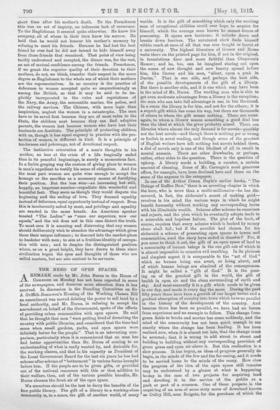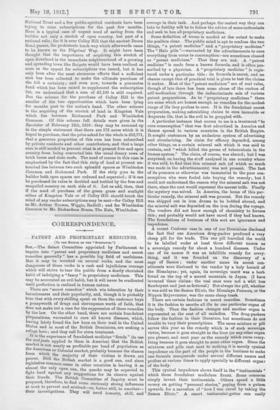THE NEED OF OPEN SPACES.
REMARK made by Mr. John Burns in the House of Commons on Monday has not been reported in some of the newspapers, and deserves more attention than it has received. In discussion in the Standing Committee on Sir A. Griffith-Boscawen's Housing of the Working Classes Bill an amendment was moved deleting the power to sell land by a local authority, and Mr. Burns, in refusing to accept the amendment on behalf of the Government, spoke of the effects of providing urban communities with open spaces. He said that he thought that men "were getting tired of drenching the country with public libraries, and considered that the time had come when small gardens, parks, and open spaces were infinitely better for the people." That is an interesting com- parison, particularly when it is remembered that no man has had better opportunities than Mr. Burns of coming to an understanding of what is really wanted by, and desirable for, the working classes, and that in his capacity as President of the Local Government Board for the last six years he has had scheme after scheme of " betterment" in various forms brought before him. If the people are to be given gifts, or provided out of the national resources with this or that addition to their welfare, then, out of the various possible benefits, Mr. Burns chooses the fresh sir of the open space.
We ourselves should be the last to decry the benefits of the free public library. The gift of a library to a working-class community is, in a sense, the gift of another world, of many
worlds. It is the gift of something which only the working man of exceptional abilities could ever hope to acquire for himself, which the average man knows he cannot dream of possessing. It opens new horizons ; it unlocks doors and breaks down barriers. The untutored clerk finds himself within reach at once of all that was ever taught or learnt at a university. The highest literature of Greece and Rome waits there on the printed page for him, if not in the original, in translations finer and more faithful than Chapman's Homer ; and he, too, can be imagined staring out upon the ocean of new thought and new beauty spread before him, like Cortez and his men, "silent, upon a peak in Darien." That is one side, and perhaps the best side, of the possible developments of the gift of a library. But there is another side, and it is one which may have been in the mind of Mr. Burns. The working man who is able to get even moderate advantages from a library is the exception; the man who can take full advantage is one in ten thousand. In a sense the library is for him, and not for the others; it is a superb gift which has come his way, but there are thousands of others to whom the gift means nothing. There are some again, to whom a library means something a good deal less than the ideal at which the giver probably aimed. There are libraries where almost the only demand is for novels—possibly not the best novels—and though there is nothing per se wrong or foolish in novel reading, and though some of the greatest of English writers have left nothing but novels behind them, a diet of novels only is one of the likeliest of all to result in mental anmmia. There are other drawbacks, or perhaps, rather, other sides to the question. There is the question of upkeep. A library needs a building, a curator, a certain amount of cleaning. Some of Mr. Carnegie's most generous offers, for example, have been declined here and there on the score of the expense to the ratepayer.
In one of Sir Arthur Conan Doyle's earlier books, " The Doings of Raffles Haw," there is an arresting chapter in which the hero, who is more than a multi-millionaire—he has dis- covered, in fact, the alchemist's secret of making gold— revolves in his mind the various ways in which he might benefit humanity without working any corresponding harm with his illimitable wealth. Scheme after scheme he examines and rejects, and the plan which he eventually adopts leads to a miserable and hopeless failure. The plot of the book, of course, requires that every scheme which is backed by money alone shall fail; but if the novelist had chosen for his alchemist a scheme of presenting open spaces to towns and communities, need the story have ended in disaster P For, if you come to think it out, the gift of an open space of land to a community of human beings is the one gift out of which it is almost impossible to conceive evil resulting. In its plainest and simplest aspect it is comparable to the "act of God" which no human being can avert, or bring about, and of which human beings are absolved of the consequences. It might be called a " gift of God." It is the pass- ing on of the greatest gift in the world, the gift of health in open air and the clean surrounding of earth and sky. And most assuredly it is a gift which needs to be given in our day, and needs it every day the more. During the past fifty years there have been a growth of our larger towns and a gradual absorption of country into town which have no parallel in the history of the development of the country. And because there has been no parallel, we have had no lesson from experience and no example to follow, This change from green fields to bricks and mortar has come suddenly, and the mind of the community has not been quick enough to see exactly where the change has been leading. It has been realized now, when it is almost too late, that the change must be arrested ; that it is wrong to add street to street and building to building without any corresponding provision of green grass and open air above it. But this realization is a slow process. It has begun, as ideas of progress generally do begin, in the minds of the few and the far-seeing, and it needs to be carried home to the minds of the many. How slow the progress of the idea of the open space still remains may be understood by a glance at what is happening to-day in the case of two projects for acquiring land and devoting it to the service of the public as a park or part of a common. One of these projects is the acquiring of an area of some sixty acres of downland known as Colley Hill, near Reigate, for the purchase of which the National Trust and a few public-spirited residents have been trying to raise subscriptions for the past few months. Here is a typical case of urgent need of saving from the builder not only a stretch of open country, but part of a national relic; for it is over Colley Hill that the ancient Drove Road passes, the prehistoric track-way which afterwards oame to be known as the Pilgrims' Way. It might have been thought that the importance of acquiring this stretch of open downla.nd in the immediate neighbourhood of a growing and spreading town like Reigate would have been realized as soon as the appeal for subscriptions was issued, but it has only been after the most strenuous efforts that a sufficient sum has been collected to make the ultimate purchase of the hill a certainty ; and even now, towards a guarantee fund which has been raised to supplement the subscription list, we understand that a. sum of £1,100 is still required. But the scheme for the purchase of Coley Hill is the smaller of the two opportunities which have been lying for months past to the nation's hand. The other scheme is the acquiring of the stretch of land in Kingston Vale which lies between Richmond Park and Wimbledon Common. Of this scheme full details were given in the Spectator of February 12th, 1910: they may be summed up in the simple statement that there are 172 acres which it is hoped to purchase, that the price asked for the whole is £52,771, that a generous proportion of this sum has been subscribed by private residents and other contributors, and that a large sum is still needed to prevent what is at present free and open country from being converted into the usual dreary rows of brick boxes and slate roofs. The need of rescue in this case is emphasized by the fact that this strip of laud at present un- touched lies between two such splendid spaces as Wimbledon Common and Richmond Park. If the strip goes to the builder both open spaces are reduoed and separated ; if it can be purchased its value is doubled and trebled by the free and unspoiled country on each side of it. Let us add, then, that if the need of purchase of the green grass and sunlight either of Kingston Vale or of Colley Hill should touch the mind of any reader subscriptions may be sent—for Colley Hill to Mr. Arthur Trower, Wiggie, Redhill ; and for Wimbledon Common to Mr. Richardson Evans, The Keir, Wimbledon.











































 Previous page
Previous page